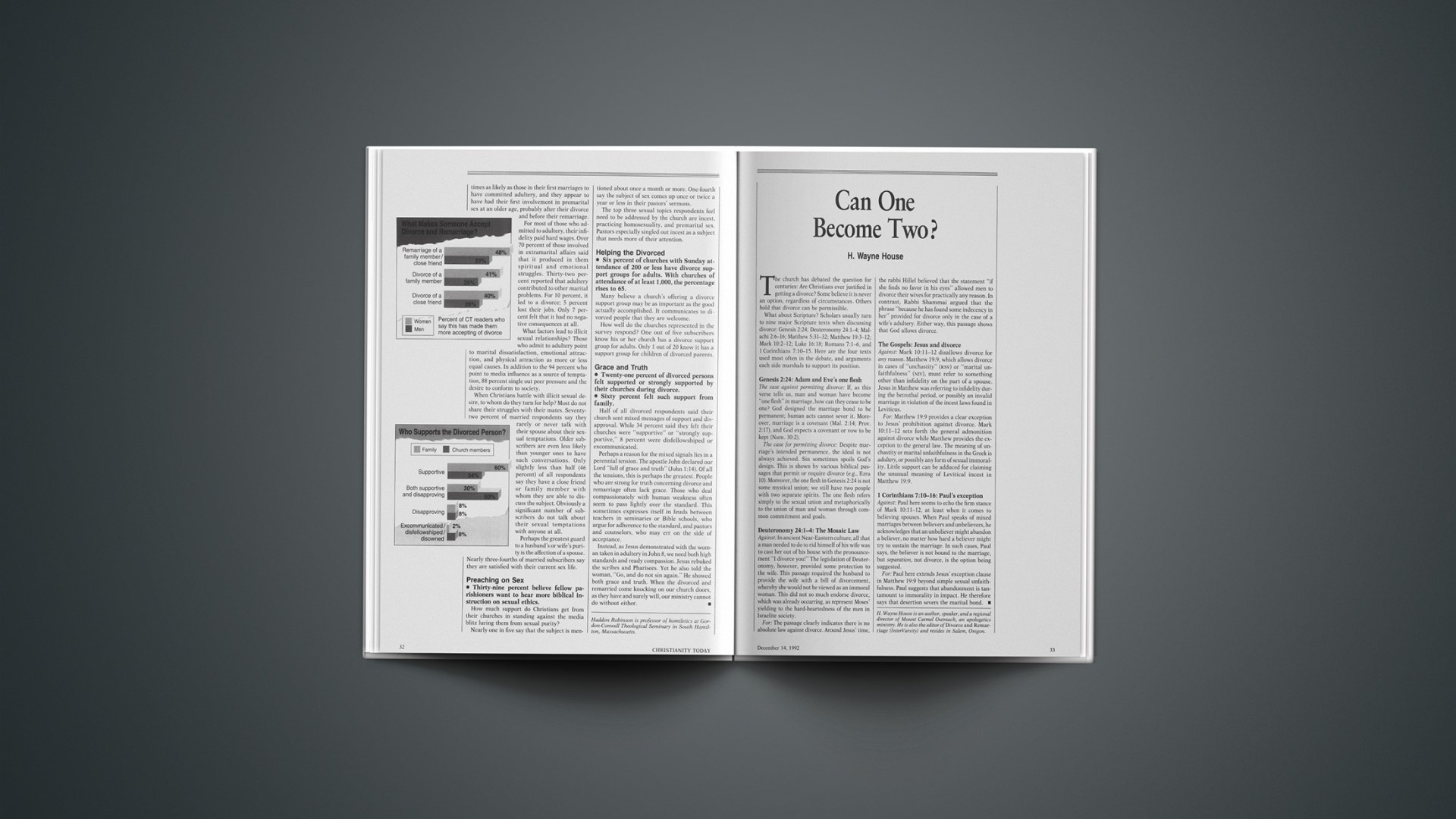H. Wayne House1H. Wayne House is an author, speaker, and a regional director of Mount Carmel Outreach, an apologetics ministry. He is also the editor of Divorce and Remarriage (InterVarsity) and resides in Salem, Oregon.
The church has debated the question for centuries: Are Christians ever justified in getting a divorce? Some believe it is never an option, regardless of circumstances. Others hold that divorce can be permissible.
What about Scripture? Scholars usually turn to nine major Scripture texts when discussing divorce: Genesis 2:24; Deuteronomy 24:1–4; Malachi 2:6–16; Matthew 5:31–32; Matthew 19:3–12; Mark 10:2–12; Luke 16:18; Romans 7:1–6, and 1 Corinthians 7:10–15. Here are the four texts used most often in the debate, and arguments each side marshals to support its position.
Genesis 2:24: Adam And Eve’S One Flesh
The case against permitting divorce: If, as this verse tells us, man and woman have become “one flesh” in marriage, how can they cease to be one? God designed the marriage bond to be permanent; human acts cannot sever it. Moreover, marriage is a covenant (Mal. 2:14; Prov. 2:17), and God expects a covenant or vow to be kept (Num. 30:2).
The case for permitting divorce: Despite marriage’s intended permanence, the ideal is not always achieved. Sin sometimes spoils God’s design. This is shown by various biblical passages that permit or require divorce (e.g., Ezra 10). Moreover, the one flesh in Genesis 2:24 is not some mystical union; we still have two people with two separate spirits. The one flesh refers simply to the sexual union and metaphorically to the union of man and woman through common commitment and goals.
Deuteronomy 24:1–4: The Mosaic Law
Against: In ancient Near-Eastern culture, all that a man needed to do to rid himself of his wife was to cast her out of his house with the pronouncement “I divorce you!” The legislation of Deuteronomy, however, provided some protection to the wife. This passage required the husband to provide the wife with a bill of divorcement, whereby she would not be viewed as an immoral woman. This did not so much endorse divorce, which was already occurring, as represent Moses’ yielding to the hard-heartedness of the men in Israelite society.
For: The passage clearly indicates there is no absolute law against divorce. Around Jesus’ time, the rabbi Hillel believed that the statement “if she finds no favor in his eyes” allowed men to divorce their wives for practically any reason. In contrast, Rabbi Shammai argued that the phrase “because he has found some indecency in her” provided for divorce only in the case of a wife’s adultery. Either way, this passage shows that God allows divorce.
The Gospels: Jesus And Divorce
Against:Mark 10:11–12 disallows divorce for any reason. Matthew 19:9, which allows divorce in cases of “unchastity” (RSV) or “marital unfaithfulness” (NIV), must refer to something other than infidelity on the part of a spouse. Jesus in Matthew was referring to infidelity during the betrothal period, or possibly an invalid marriage in violation of the incest laws found in Leviticus.
For:Matthew 19:9 provides a clear exception to Jesus’ prohibition against divorce. Mark 10:11–12 sets forth the general admonition against divorce while Matthew provides the exception to the general law. The meaning of unchastity or marital unfaithfulness in the Greek is adultery, or possibly any form of sexual immorality. Little support can be adduced for claiming the unusual meaning of Levitical incest in Matthew 19:9.
1 Corinthians 7:10–16: Paul’S Exception
Against: Paul here seems to echo the firm stance of Mark 10:11–12, at least when it comes to believing spouses. When Paul speaks of mixed marriages between believers and unbelievers, he acknowledges that an unbeliever might abandon a believer, no matter how hard a believer might try to sustain the marriage. In such cases, Paul says, the believer is not bound to the marriage, but separation, not divorce, is the option being suggested.
For: Paul here extends Jesus’ exception clause in Matthew 19:9 beyond simple sexual unfaithfulness. Paul suggests that abandonment is tantamount to immorality in impact. He therefore says that desertion severs the marital bond.










